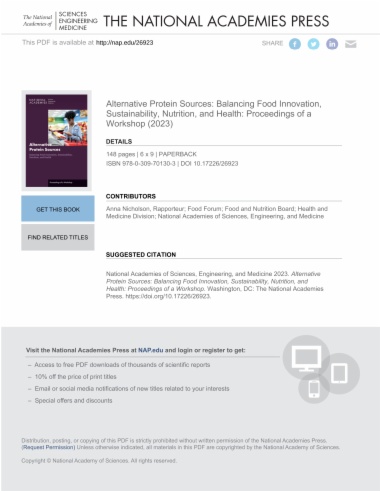

Alternative protein sources, which can be derived from plant and animal cells or created by precision fermentation, can have health, environmental, socio-economic, and ethical impacts. With a variety of types of alternative proteins being developed and available on the market, consumers, regulatory agencies, manufacturers, and researchers are faced with many different considerations. The National Academies Food Forum hosted a workshop that took a multi-sector approach to explore the state of the science on alternative protein sources as they relate to issues around diet quality, nutrition, and sustainability. The workshop also examined how alternative protein food processing innovations can be balanced in a way that optimizes nutritional content, affordability, and accessibility. This Proceedings of a Workshop summarizes the discussions held during the workshop.